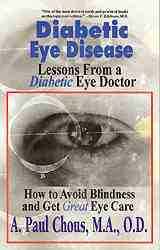This Web page brings together in one place descriptions of and links to only those Web pages dealing with diabetic retinopathy, but is linked to the 15 other On-line Diabetes Resources pages dealing with other Web pages, other parts of the Internet, and other on-line services.
- Five researchers at three German universities and two in the United States have found that something called benfotiamine blocks three of the four major pathways leading to damage from the most common form of diabetes-related eye disease. Rats with diabetes that were treated with this synthetic form of Vitamin B1 for 36 weeks did not develop any of the retina damage found in a similar group of untreated rats. Although benfotiamine has been widely used to prevent diabetic retinopathy in Europe for more than a decade, there are no double-blind clinical trials in humans. The could, however, start within a year. The study appears in the February 18 advance online edition of Nature Medicine. The abstract is free online at http://www.ncbi.nlm.nih.gov/entrez/query.fcgi?cmd=Retrieve&db=PubMed&list_uids=12592403&dopt=Abstract.

- Diabetic Eye Disease: Lessons From a Diabetic Eye Doctor is a great new book by Dr. A. Paul Chous, who himself has suffered from retinopathy. The URL is
http://www.mendosa.com/diabetes_update_54.htm#Eye - Dr. Chous has an excellent Web site—covering his book and more—at http://www.diabeticeyes.com/
- Progressive Research Labs Inc. in Austin, Texas, now offers Vision Nutrition Rx as a supplement formulated for those experiencing vision deterioration. President Rick Womack says that it is formulated to prevent diabetic retinopathy. One of the key ingredients is Grape Seed Extract, which is known as a extremely potent antioxidant that destroys harmful scavenging free radicals. It also contains lutein and the herbs bilberry and yucca, which have been shown to improve vision. The antioxidants vitamin A, C, D, and E are also been included along with the minerals selenium and zinc. The Progressive Research Lab's toll-free phone is (800) 877-0966 and the Web site is
http://www.prlab.com/vision_nutrition.htm - The Jules Stein Eye Institute at the University of California, Los Angeles, is the country's premier low vision center. The clinical activities of the Jules Stein Eye Institute are administered jointly by the Department of Ophthalmology and the UCLA Medical Center. The URL is
http://149.142.138.10/jseiweb/index.htm - The Low Vision Council, headquartered in Palm Desert, California, is an international group of manufacturers, practitioners, educators, agencies and associations working together to raise awareness of low vision rehabilitation among eye care providers, as well as visually impaired consumers and their caregivers. The URL is
http://www.lowvisioncouncil.org/index.html - The Virtual Health Care Team at the School of Medicine, University of Missouri, Columbia, has written up a most interesting case about a person with diabetic retinopathy and resulting low vision. I reviewed it for my American Diabetes Association column at http://www.diabetes.org/main/community/info_news/web/april0102.jsp and the URL of the case study is at
http://www.vhct.org/case3002/ - VisionCare Ophthalmic Technologies Ltd., headquartered in Israel with offices in Zurich, Switzerland, and Saratoga, California, has developed an implantable minaturized telescope as a solution for macular degeneration. This device, which restores central vision without the need for special glasses, is now in clinical trials (and my brother-in-law has benefited hugely). The URL is
http://www.visioncare.co.il/index.html - The Diabetics Division of the National Federation of the Blind is a support and information network for all people with diabetes, especially those who are blind or losing vision. Its URL is
http://www.nfb.org/nfb/Diabetics.asp - Diabetes Sight is Prevent Blindness America's new Web site specifically about diabetic retinopathy. Its URL is
http://www.diabetes-sight.org/ - The American Academy of Ophthalmology—the eye M.D. association—is one of the largest American professional organizations concerned with loss of sight. The address of its Web site is
http://www.aao.org/ - The public Web site of the American Optometric Association is offered by the other large American professional organization concerned with loss of sight. The address of this site is
http://www.theaoa.org/ - The American Diabetes Association's Position Statement on Diabetic Retinopathy insists that both type 1 and type 2 patients with diabetes should be examined "annually by an ophthalmologist or optometrist who is knowledgeable and experienced in diagnosing the presence of diabetic retinopathy and is aware of its management." The URL is
http://care.diabetesjournals.org/cgi/content/full/26/suppl_1/s99 - The American Diabetes Association has a less technical introduction to diabetic retinopathy too. You can read Eye Care and Retinopathy at http://www.diabetes.org/main/application/commercewf?origin=*.jsp&event=link(B3_3)
- The Diabetic Retinopathy Foundation is a not-for-profit organization that supports research and public awareness on one of the world's major causes of blindness—diabetic retinopathy. Located in Chicago, the foundation seeks to educate the public about the causes of diabetic retinopathy. The information about the disease on its Web site helps to achieve that goal. The URL is
http://www.retinopathy.org/ - "Facts about Diabetic Retinopathy" is an excellent pamphlet by the National Eye Institute to help people with diabetic retinopathy and their families and friends better understand the disease. The URL is
http://www.nei.nih.gov/health/diabetic/retinopathy.asp - MEDLINE Plus Health Information has an outstanding collection of links to Web pages about diabetic eye problems. The URL is http://www.nlm.nih.gov/medlineplus/diabeticeyeproblems.html
- Diabetic Retinopathy Fact Sheet has "your questions answered" at http://www.eri.harvard.edu/htmlfiles/dr.html
- Retinopathy at Children with Diabetes is the story of the eye in pictures. See http://www.childrenwithdiabetes.com/d_0n_f10.htm
- Diabetes and Your Eyes is an outstanding review of the basics of retinopathy. See http://www.diabetesmonitor.com/dm-eyes.htm
![[Go to Previous Web Page]](previous.gif) Go back
to Diabetic Neuropathy Web Resources Page
Go back
to Diabetic Neuropathy Web Resources Page
![[Go to Previous Web Page]](previous.gif) Go back
to Main On-line Resources Page
Go back
to Main On-line Resources Page
You may quote part of this page in on-line documents and printed publications, but please notify me so I can add a reference and make sure that you add pointers to the places where people can get the latest version.
Permission to link this site to yours is not needed. Of course, I would be delighted to hear from you, especially if you have a new site that you think should be linked here.
I have no control over the content or continued existence of any external on-line resources linked here, and I therefore cannot guarantee that they will function as promised. The appearance of a site on this list does not imply any endorsement by me.
Since this information is constantly changing, readers are urged to email corrections and updates to me at mendosa@mendosa.com.
If you have a question about your health, please go to either Diabetes Questions & Answers at the Diabetes Monitor, or use the Question Form for the Diabetes Team at Children with Diabetes.



